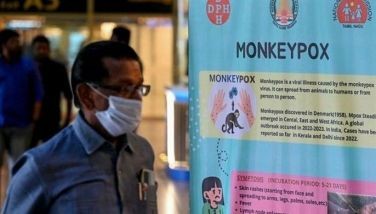Cyprus president: No bad peace deal will be put to a vote
NICOSIA — Talks aimed at reunifying Cyprus were back on track yesterday after the leaders of the ethnically split island ended a two-week stalemate by agreeing to meet next month to tackle the most difficult issues in the way of a peace deal.
In a statement issued early yesterday, the United Nations said Greek Cypriot President Nicos Anastasiades and breakaway Turkish Cypriot leader Mustafa Akinci agreed to meet in Geneva next month to negotiate how much territory each side would control in an envisioned, two-zone federation.
The final day of the four-day summit scheduled to start Jan. 9 would bring together Greece, Turkey and Cyprus' former colonial ruler, Britain, to discuss ensuring on-the-ground security after an accord is signed.
The UN said negotiators would step up meetings in Cyprus ahead of the Geneva summit to tackle other unresolved issues.
The positive news ended two weeks of finger-pointing over which side was to blame for the impasse that threatened to scuttle 19 months of solid progress.
A 1974 Turkish invasion following a coup aimed at union with Greece split the island into an internationally recognized Greek-speaking south and a breakaway, Turkish-speaking north.
A Turkish Cypriot declaration of independence is recognized only by Turkey which keeps more than 35,000 troops in the north.
Word that the talks were back on came after Anastasiades and Akinci cleared the air during a dinner hosted by UN envoy Espen Barth Eide. The Thursday night dinner was the two leaders' first face-to-face meeting after talks in the Swiss resort of Mont Pelerin broke down last month.
The sticking point was how many displaced Greek Cypriots would be eligible to reclaim lost homes and property in redrawn federal zones. Anastasiades wanted as many as 90,000 people to be able to reclaim homes and property, while Akinci offered a maximum 65,000.
Akinci said if a deal is struck next month, it would take an additional few weeks to hammer out the last technical details with the aim of bringing a comprehensive accord to a vote in simultaneous referendums in both communities by mid-2017.
"Our region is plunged into bloodshed. This would be a good example for our region," Akinci told reporters after briefing lawmakers.
The Greek Cypriot side says federal boundaries should be redrawn in a way that would allow the majority of Greek Cypriots displaced by the invasion to reclaim homes and property.
They argued that would not only keep the peace accord's costs down by limiting the compensation that would need to be paid to those ineligible to reclaim property, but also shore up support for a deal among Greek Cypriots.
Turkish Cypriots insist the territorial adjustments should keep the number of Turkish Cypriots who would be forced to relocate to the bare minimum.
In a televised address on yesterday night, Anastasiades tried to counter concerns voiced by political opponents that the Geneva talks are designed to force him into making concessions.
The decision to resume the stalled talks avoids "serious dangers" that a complete collapse of the peace process would entail, he said.
Anastasiades also appealed for unity and urged political leaders to avoid "unsubstantiated interpretations" creating rifts among the public.
Another key sticking point is a Turkish Cypriot demand to cede Turkey the right to militarily intervene and to keep troops on the island under any deal.
The minority Turkish Cypriots see Turkey's troops as vital for their security, while Greek Cypriots consider them as a threat undermining the island's sovereignty.
The decision to resume talks came after Turkey's President Recep Tayyip Erdogan earlier this week suggested that Greek Cypriots would not be permitted to fulfill their goal of controlling the entire island. Anastasiades decried the remarks as unacceptable.
- Latest
- Trending































